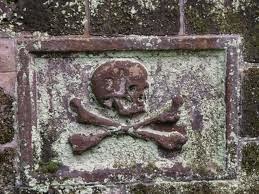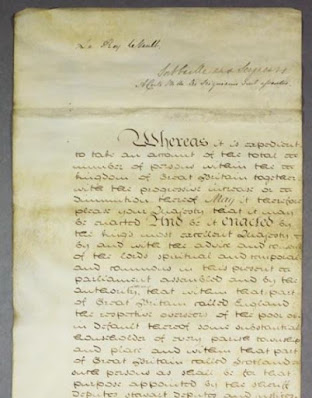Tracking down the dear departed
In this post I will try to uncover the resources for determining date of death in Australia, UK and USA. So lets go delving into the wills, tombstones, cemeteries, notices and archives of our ancestors.....

Many of the graves I saw at Greyfrairs Cemetary, Edinburgh, Scotland
had skulls and crossbones on them. This was quite common in the 1600's
When you are searching for the death records, remember the golden rule of sources - at least two pieces of corroborating evidence.
So how do you know the John Smith death record you found is your John Smith? You need to verify at least two bits of information - for example, are the names of the parents correct? Is the DOB correct? etc. This can be quite hard sometimes, I recently received an early Australian record where no parents or location of birth are recorded, just the age at death, the name of the deceased and where and when they died. This still stands as a "possible" until I can confirm some of the information. Confirmation could come in may forms, often an obituary is the most useful as they contain names of family.
Compare these two records to see just how different they can be - both were issued by the same NSW Births, Deaths and Marriages department, but the first one contains very little information.
What sources can you use?
Death Certificates are the obvious first choice as they are a primary source, but bear in mind that these can have some problems:
- It is relatives who give the information for the death certificate, so family myths can be handed down. This can especially be the case for age!
- There are different types of certificates - especially note the difference between "full" and "extract". Always obtain a full certificate if possible.
- Spelling mistakes are very common.
- Obtaining corroborating information.
Death Indexes can often be the first place you will find information, keep in mind that up to 25% of indexes contain spelling mistakes and this can find it difficult to find the person you are after. Try some variations of the name, even obvious mistakes to try to narrow it down. An example of a death index is the NSW BDM website, which lists some information and makes it possible to obtain the certificate number you need. Remember that indexes are not a vital or primary source in themselves.
Newspapers contain death and funeral notices and obituaries. In Australia, search using Trove.
The ProQuest Historical Newspapers collection includes newspapers from the UK and USA. Access to ProQuest newspapers can usualy be obtained through your local library or state library.
Google news archives are another source of newspapers, before you use it check here for a lot of time saving tips.
Obituaries and funeral notices often contain a lot of information about the person you are looking for, typically listing all the spouses and children, along with brothers and sisters. This makes them a goldmine for us searchers.
Wills and probate documents can also contain a wealth of information. In Australia, these are held at STATE level, and Coraweb has an excellent list. Remember that it is the state the person died in! A good guide has been compiled by Graham Jaunay just click here to go to it. Many wills and probate documents are not online, and may require a visit to the relevant office.
One of the wills of my GG Grandfather, is several "packets" long, and the probate trail includes a person I still have not identified! Eventually I will be able to piece it all together, but it will certainly take some time. In the meantime, it has given me a lot of information about the family, and Willliam Stewart Clark. He ended his life quite wealthy both in cash and houses, obviously he was a successful builder. When I enquired about him at the Bendigo Library, the Family History Librarian said "why don't we know about him?" as he built many of the workmen cottages in Bendigo. Some are still standing.
If your ancestors died in the UK search for them at the UK Wills and Probate site. Note that this site does not contain Scotland or Irish records, read the Scottish guide and Irish guide from the relevant National Archives sites to understand where they will be available. The location will depend upon the time frame you are searching for.
If your ancestors died in the USA, start with the guide on family search and then go to the relevant State site.
Cemeteries and Graves seem to be a lottery, some revealing much, others none at all. I found the gravesite of one of my GG grandparents, but sadly, no headstone at all, so there was no information to be found. To find a grave, the first step is to determine where the person died, then look for cemetaries in the area. Once you find the Cemetery, check online or contact them to see if the person is there, and where the grave is. Find a Grave is a great resource for this also, as they have millions of records.
Once you have the location, take a trip and photograph the gravesite, then upload it yourself onto find a grave.
A final word..... Obituaries and gravestones can be quite revealing. A famous commedian wanted the following epitath on his-
"I told them I was sick."
I hope mine never looks like this one:
Oscar Wild's Tomb is very interesting:

The epitaph is a verse from The Ballad of Reading Gaol:
And alien tears will fill for himPity's long-broken urn,
For his mourners will be outcast men,And outcasts always mourn.
I always read the Obits in the SMH, some are quite surprising, I found one where the deceased has spent his life obtaining entry into sporting events, particularly the members stand at the cricket, quite fraudulantly! A great life!






Comments
Post a Comment
Thank you for your comment on my Blog. I love to get feedback and information to share from my readers.
To keep up to date simply follow me on facebook or subscribe using the button at the top of the blog page.
Barb